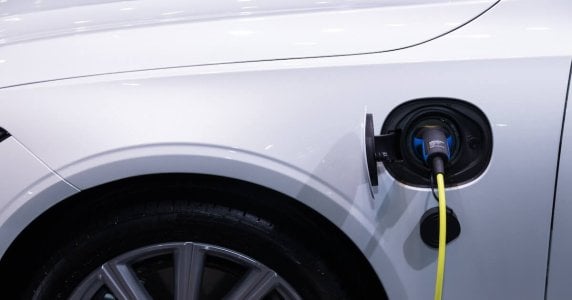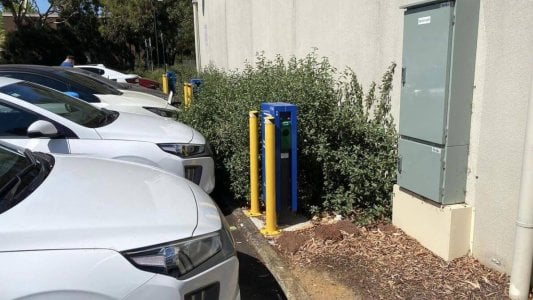Are you unknowingly breaking the law and facing a $3200 fine? Find out now!
- Replies 37
Electric vehicles are becoming more and more popular – and this means that there are brand new penalties specifically designed to support the transition to electric vehicles on our roads.
Adding to an ever-evolving list of road rules and regulations, four Australian states and territories have rolled out hefty fines for drivers who are caught breaking a lesser-known and new rule.
Drivers from the Australian Capital Territory, New South Wales, Queensland, and Victoria could face fines as high as $3,200 for ‘ICE-ing’, or the term for parking in spaces meant for electric vehicles and blocking an electric vehicle’s charging station.
Additionally, the maximum penalty for obstructing charging stations has been introduced by the states of ACT, NSW, and QLD, with fines of up to 20 penalty points.
However, the fine amounts differ in each state because of different unit prices. It could go up to $3,200 in the ACT, $2,200 in NSW, and $2,875 in QLD. Meanwhile, in Victoria, misusing an electric vehicle’s charging spot incurs a fine of $369 and two penalty units.
New South Wales Metropolitan Roads Minister Natalie Ward said the government added the road rule to ‘support the transition to electric vehicles on our roads’.
‘To make sure we keep the community moving forward, we want electric vehicle drivers to have access to charging stations when they are on offer,’ she said.
In a poll released by Yahoo!News, they asked social media users if $3,200 is too high of a price to pay for parking in an electric charging bay. As of writing, 78 per cent of social media users who voted agreed that the hefty fine was unreasonable. Meanwhile, 22 per cent disagreed and said this sends an important message to drivers.
In comparison, in NSW, the fine for parking in a standard no-parking zone is $117, and $275 for stopping in a no-stopping zone.
Despite the hefty penalties, experts say that this new rule is important to encourage electric vehicle adoption and prevent drivers from doing the equivalent of parking ‘in front of a fuel bowser’.
And while the fines apply to drivers who leave petrol or diesel vehicles in spaces designated for electric cars, EV drivers who occupy the spots while not recharging their vehicles can also face penalties.
Chris Jones, National President of the Australian Electric Vehicle Association, said that while the penalties for blocking infrastructure were high, they were necessary to educate the public – especially drivers who do not consider the repercussions of their actions.
‘No one would like it if I parked my vehicle in front of a fuel bowser and walked inside and ordered lunch. There needs to be an acknowledgement that there are places you can park and places you can't, and right in front of an EV charger is one where you can't,’ he explained.
Electric Vehicle Council Policy Head Jake Whitehead stated that the fines send ‘a very clear and strong signal’.
‘Every charger available is critical and valuable to the fleet of 80,000-odd EVs in the country, and we need to make sure they’re not blocked, either intentionally or accidentally,’ Mr Whitehead claimed.
He added that while people make genuine mistakes while parking, there needs to be a broader recognition across society. ‘These chargers need to be available to EVs so we can have more on our roads,’ he said.
Mr Whitehead also thinks that greater education is needed for petrol car drivers who have encountered chargers added to existing car parks, as well as new EV drivers who do not recognise the need to vacate charging locations for other drivers as soon as possible.
In February, the NSW Government announced a fast-tracked rollout of public and private 30,000 chargers by 2026.
According to the EV, there are more than 83,000 electric vehicles in Australia, with battery-powered vehicles making up 6.8% of all new car sales in February.
This comes after another road rule was uncovered recently. It was reported that if you’re caught by police speeding up just as another vehicle is trying to overtake you, you could land yourself either an on-the-spot fine of $86 or up to $2,875 in court fees – depending on where you’re caught. You can read more about this rule in this article.

Members, have you heard of ICE-ing before? How do you feel about the heavy penalties that have been introduced? Share your thoughts in the comments below.
Adding to an ever-evolving list of road rules and regulations, four Australian states and territories have rolled out hefty fines for drivers who are caught breaking a lesser-known and new rule.
Drivers from the Australian Capital Territory, New South Wales, Queensland, and Victoria could face fines as high as $3,200 for ‘ICE-ing’, or the term for parking in spaces meant for electric vehicles and blocking an electric vehicle’s charging station.
Additionally, the maximum penalty for obstructing charging stations has been introduced by the states of ACT, NSW, and QLD, with fines of up to 20 penalty points.
However, the fine amounts differ in each state because of different unit prices. It could go up to $3,200 in the ACT, $2,200 in NSW, and $2,875 in QLD. Meanwhile, in Victoria, misusing an electric vehicle’s charging spot incurs a fine of $369 and two penalty units.
New South Wales Metropolitan Roads Minister Natalie Ward said the government added the road rule to ‘support the transition to electric vehicles on our roads’.
‘To make sure we keep the community moving forward, we want electric vehicle drivers to have access to charging stations when they are on offer,’ she said.
In a poll released by Yahoo!News, they asked social media users if $3,200 is too high of a price to pay for parking in an electric charging bay. As of writing, 78 per cent of social media users who voted agreed that the hefty fine was unreasonable. Meanwhile, 22 per cent disagreed and said this sends an important message to drivers.
In comparison, in NSW, the fine for parking in a standard no-parking zone is $117, and $275 for stopping in a no-stopping zone.
Despite the hefty penalties, experts say that this new rule is important to encourage electric vehicle adoption and prevent drivers from doing the equivalent of parking ‘in front of a fuel bowser’.
And while the fines apply to drivers who leave petrol or diesel vehicles in spaces designated for electric cars, EV drivers who occupy the spots while not recharging their vehicles can also face penalties.
Chris Jones, National President of the Australian Electric Vehicle Association, said that while the penalties for blocking infrastructure were high, they were necessary to educate the public – especially drivers who do not consider the repercussions of their actions.
‘No one would like it if I parked my vehicle in front of a fuel bowser and walked inside and ordered lunch. There needs to be an acknowledgement that there are places you can park and places you can't, and right in front of an EV charger is one where you can't,’ he explained.
Electric Vehicle Council Policy Head Jake Whitehead stated that the fines send ‘a very clear and strong signal’.
‘Every charger available is critical and valuable to the fleet of 80,000-odd EVs in the country, and we need to make sure they’re not blocked, either intentionally or accidentally,’ Mr Whitehead claimed.
He added that while people make genuine mistakes while parking, there needs to be a broader recognition across society. ‘These chargers need to be available to EVs so we can have more on our roads,’ he said.
Mr Whitehead also thinks that greater education is needed for petrol car drivers who have encountered chargers added to existing car parks, as well as new EV drivers who do not recognise the need to vacate charging locations for other drivers as soon as possible.
In February, the NSW Government announced a fast-tracked rollout of public and private 30,000 chargers by 2026.
According to the EV, there are more than 83,000 electric vehicles in Australia, with battery-powered vehicles making up 6.8% of all new car sales in February.
This comes after another road rule was uncovered recently. It was reported that if you’re caught by police speeding up just as another vehicle is trying to overtake you, you could land yourself either an on-the-spot fine of $86 or up to $2,875 in court fees – depending on where you’re caught. You can read more about this rule in this article.
Key Takeaways
- Drivers could be fined as much as $3,200 for parking in a space for electric vehicles.
- The fines, ranging from $3,200 in the Australian Capital Territory to $369 in Victoria, are intended to encourage electric vehicle adoption and prevent drivers 'ICE-ing' or using internal combustion engine cars in EV spaces.
- Victorian drivers can be fined $369 for misusing an electric vehicle charging space.
- The Australian Electric Vehicle Association and the Electric Vehicle Council advise greater education may be needed for petrol car drivers who encounter chargers in existing car parks and for new electric vehicle drivers who may lack understanding of the need to vacate charging locations for other drivers.









